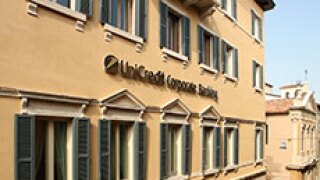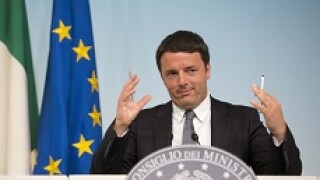Italy
-
All but one of the banks that underwrote Saipem’s €3.5bn rights issue, and were left holding €427m of the Italian oil and gas engineering group’s stock, are selling down their stakes tonight.
-
Two of Italy’s popolari banks have registered to be listed on the Italian stock exchange and, with two others entering advanced merger talks on Tuesday, the country finally looks to be making headway on the banking reforms passed last year.
-
UniCredit was largely absent from the euro senior market last year, but, having successfully priced a new seven year last Friday, the bank’s head of group finance expects a busier year in 2016.
-
Two of Italy’s popolari banks have registered to be listed on the Italian stock exchange, and with two others entering advanced merger talks on Tuesday, the country finally looks to be making headway on the banking reforms passed last year.
-
Banca Popolare di Vicenza has filed a request for admission of its shares on Borsa Italiana, ahead of a shareholder vote to approve the bank’s IPO and capital increase.
-
UniCredit was largely absent from the euro senior market last year, but, having successfully priced a new seven year last Friday, the bank’s head of group finance expects a busier year in 2016.
-
Delve into the details of their respective economic and political prospects, and Italy’s investor credentials are seemingly more favourable than Spain’s, writes Jeremy Weltman.
-
Pirelli will not refinance its €6.8bn acquisition bridge loan in the bond market as planned. A torpid high yield bond market has spooked the borrower away from capital markets and back to bank loans.
-
Saipem, the Italian oil and gas engineering group, failed to sell all of its €3.5bn rights issue to shareholders by last Friday, in an ominous sign for other commodities firms that may still need to raise fresh capital.
-
Pirelli will not refinance its €6.8bn acquisition bridge loan in the bond market as planned. A torpid high yield bond market has spooked the borrower away from capital markets and back to bank loans.
-
Saipem’s unfortunate €3.5bn capital raise could have wide-ranging consequences for other firms desperately in need of fresh cash to weather the commodities downturn.
-
Spain's spread over Italian bonds could widen further as investors fret over its finances while responding positively to the reforms led by Italy prime minister Matteo Renzi, despite Spain shrugging off a move from positive to stable outlook from Moody's late last week.










